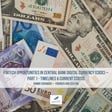
Bonus: What We Know About the FTX Collapse?
Executive Summary
In this bonus episode of our expert interview series, Antonio Fatas, Professor of Economics at INSEAD, joins us to provide insights into the current situation with FTX. We've gathered a good deal of information about the collapse so far but there is still much that remains unknown. We delved into some of the known facts surrounding FTX and pondered together on what could happen in the future. It's clear from our discussion that FTX was not a regulated financial institution, and also had its own unique challenges. We'll be keeping an eye out for more developments related to FTX as time goes on to see what other lessons we can learn.
I do believe there are other places where entities are insolvent, we just have not seen it yet.Antonio Fatas, Professor of EconomicsSubscribe Here
We are always sharing new resources with you. Find all of our options below. https://linktr.ee/startupradio
FTX suffered from bad management and likely fraud as wellAntonio Fatas, Professor of EconomicsBackground
As crypto continues to grow into a new and important market, the digital asset industry has been rocked by the sudden collapse of one of its biggest crypto exchanges - FTX. Led by crypto personality Sam Bankman-Fried, FTX had previously been ranked as the world’s third-biggest crypto exchange in terms of trading volume, so its downfall came as quite a shock to crypto investors. This news is sure to cause ripples throughout the crypto industry for a long time, and it serves as another reminder that despite its rising popularity, crypto remains an unpredictable and high-risk gamble.
Regulators may now have a different view on the risks and regulations of crypto. Antonio Fatas, Professor of EconomicsThis event echoed Mt Gox’s downfall although the underlying problem was quite different. Unlike Mt. Gox which fell victim to hack, FTX merely could not keep up with the sudden demand for withdrawals caused by investors who were losing faith in the platform. The resulting effect sent FTT, their native token, tumbling and kicked off a domino effect causing customers to rush out of the exchange and further crippling its ability to sustain itself, leading inevitably to its demise.
I find it very revealing that these tokens that are supposed to work with high inflation, because the central banks are all crazy but this is the way to hold on to your purchasing power. Now that we have inflation, they are collapsing. That to me is a really red flag.Antonio Fatas, Professor of EconomicsBitcoin crashed, Ethereum crashed, and almost every other major token did the same. Then Binance stepped in, with the world’s number one exchange announcing it would buy FTX and ensure everyone gets repaid. But just as soon as the market settled, Binance announced a U-turn, saying the situation at FTX was beyond recovery.
The implications from the complase of FTX will be felt for crypto for the coming years in more an thougher regulations. That is why we will follow the story. We start with a discussion of the situation with our guest. Professor Fatas.
The Expert
Antonio is an influential professor of economics with an impressive set of credentials. With a Ph.D. in Economics from Harvard University and a research fellowship at the Centre for Economic and Policy Research in London, he brings broad expertise to his job as a Professor of Eco













